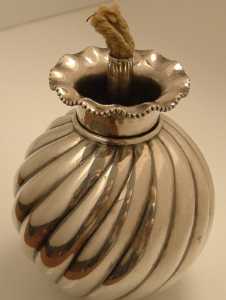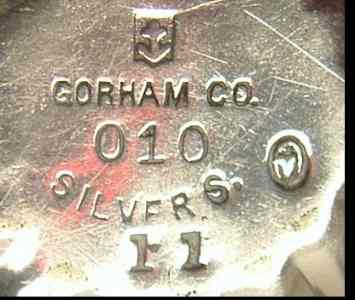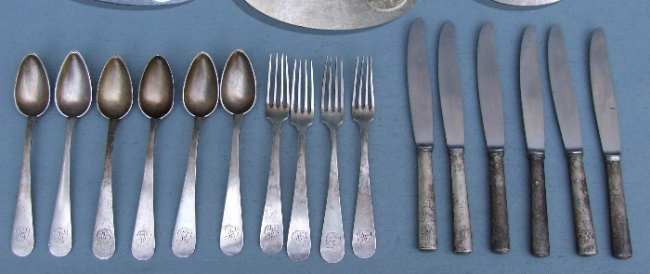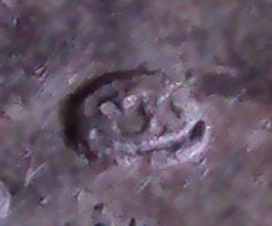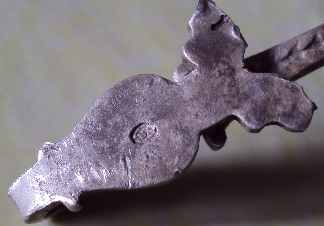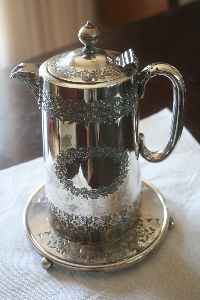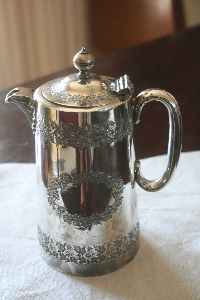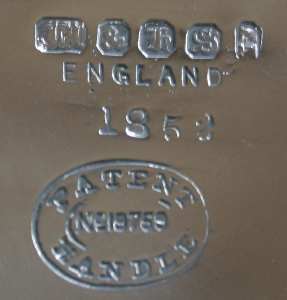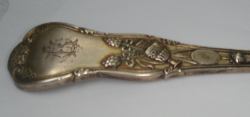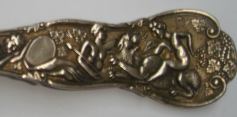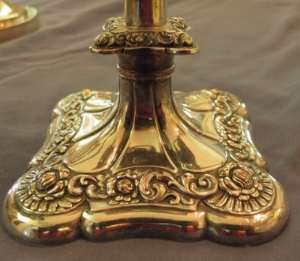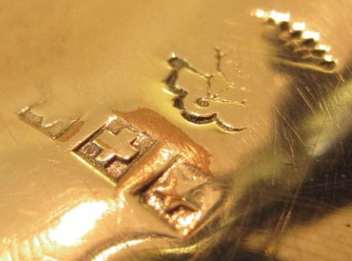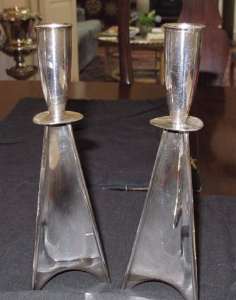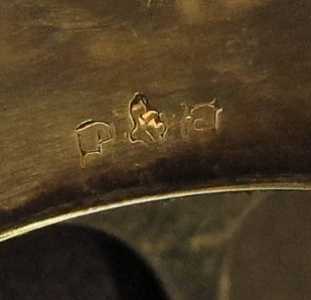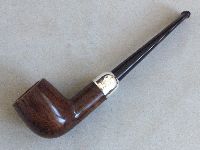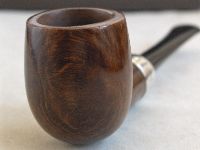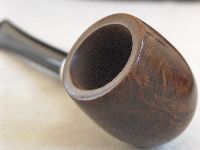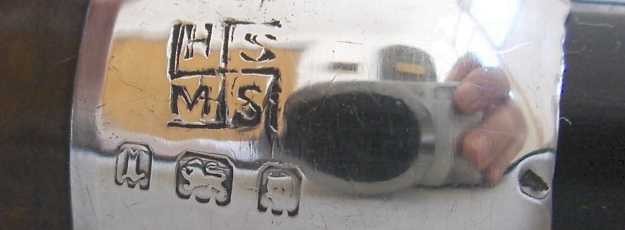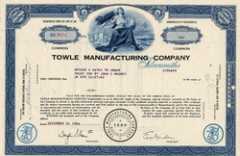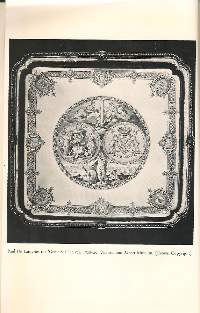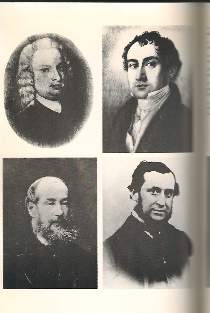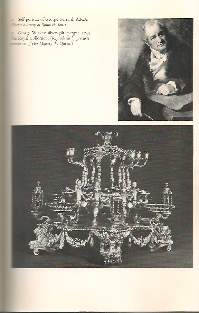|
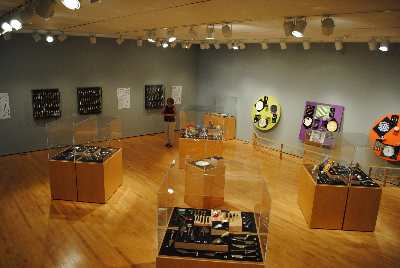
Dorothea Burstyn presents:
Exhibition: Fabulous Flatware - Non-traditional Tools
of the Table
The William P. Hood Jr. collection of contemporary
flatware 
The opening party of the exhibition Fabulous Flatware
- Non-traditional Tools of the Table at the Paul and
Lulu Hilliard University Art Museum, Lafayette,
Louisiana, on August 19, 2011, was a glittering affair
sponsored by the eminent Gorham Martelé collectors Jolie
and Robert Shelton of Lafayette and attended by many
donors to and members of the Hilliard and the New
Orleans Museum of Art....
click here 
|
Welcome to new ASCAS members:
Colin Allen - England UK
Jean C. Anderson - USA
Marcet Bliss - USA
Deborah Chester - USA
George Drakulic - USA
John Sherwood - England UK
Ramon N. Villegas - Philippines
Members' Window # 89
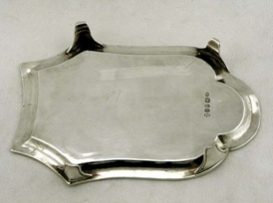
Joanne and Emmett Eldred
present the fourth part of:
Our Collecting Guidelines (4) - Hallmarks

Typically the hallmarks on the bottom of teapots are
distributed while those on the bottom of stands are in a
row. There are a few examples where this format was not
followed. However, we feel it is important to check out
teapots where the touch-marks are in a row since it is
possible to cut out a section in the bottom and solder
in a fragment with hallmarks obtained from a small item
like a spoon. It is interesting that the orientation of
the maker's mark can be the same as the assay office
hallmarks or inverted.....
click here 
|
Andrea Menarini writes:
... when I find old Italian silver objects, mainly tableware, I
try to identify the marks with the help of various books (Donaver-Dabbene,
Bulgari, etc.). Unfortunately, very few of these marks are
quoted in the books and, evidently, there are lots of still
unknown marks.
Sometimes from a flatware set some clue can be found. For
example, I forward the photos of 16 flatware pieces bearing all
the same monogram. In my opinion they were made at the beginning
of the 19th century, although the knife blades were replaced.
The forks and spoons bear various marks, including one that I
could reconstruct by combining the marks of two different pieces.
The set comes from a house in Bologna and there is reasonable to
suppose that it was made in this town. Moreover in Bologna was
active a workshop under the sign of the pomegranate (information
available only from 1859).
What do you think about?
Andrea Menarini
The mark with "GD" more than a pomegranate seems to me a
flower.
Looking on Donaver Dabbene book it could correspond to the
description of the mark (without image) of Giuseppe Ducci of
Senigallia (early nineteenth century). But I do not have
information about this maker, I never saw his mark and I ignore
if he actually manufactured flatware.
Could be useful for the identification to read the letters
inside the "diamond" on the left. The shape is that used in the
Papal State, bearing two letters identifying the town (on the
center) and the initials of the maker (on the sides).
I hope this will be useful.
Pietro Fantazzini
Olivier Dumas writes:
... Near Paris (France) I found a little fork with metal
detector. It is 10 cm wide and weighs 10 grams. I'm looking for
information about its origin and age.
Any help would be greatly appreciated.
Olivier Dumas
Joan Sunderland writes:
...I have diligently gone over your site for hours and have not
yet been able to identify the hallmark on my Grandmother's
silver or silverplated teapot. She lived in England 1850-1948.
I have provided pictures of the teapot but the hallmark is
difficult to see except for the numbers 1852 and the patent mark
for the handle. There appears to be a number 3 with a dot below
left above the hallmark.
The hallmark is a rectangle (difficult to read), a square with
an [&] another square which appears to have an ornate R or B,
another square with an ornate S and finally what appears to be a
square with an A.
Can you provide information on who the silversmith was?
Joan Sunderland
The mark is not well readable. Anyway I believe that it
belongs to Walker & Hall, Sheffield. You can find this mark and
detailed information about the firm in my web pages at
http://www.silvercollection.it/electroplatesilverWZ.html and
http://www.silvercollection.it/ENGLAWALKER&HALL.html
By the way, the patent number 12759 was attributed in 1884 (see
my web site at
http://www.silvercollection.it/dictionarylozengemark.html ).
Obviously 1884 is not when the teapot (or coffee pot) was made
but the date in which the model was registered.
Giorgio Busetto
Your spoon is hallmarked London 1857. The maker’s mark (HL
over HL) belongs to Henry John Lias & son. A detailed
information about this firm, whose origins go back to 1791 and
is still active as Wakely & Wheeler Ltd, is available in my web
site at
http://www.silvercollection.it/ENGLWAKELY&WHEELER.html
Giorgio Busetto
Carol Silverman writes:
...I trust in the help of member of ASCAS for information about
these candelabra:
The marks on this candlestick are prominent; above the
decoration on the foot; a cross between two stars with an object
above.
Nothing shows up in my silver books.
The sticks of this couple of candlesticks have a
Scandinavian look; I can't figure out the marks.
Hope someone is familiar with these marks; I am stumped!
The maker is Maurice Strauss & Henry Simon, 108-110 Golden
Lane, London. The firm entered a similar hallmark in Chester
Assay Office on March 13, 1914.
The presence of the swastika is not surprising in a hallmark
entered in 1914, as this is an ancient symbol frequently used
before the advent of Nazism (and fascism).
It was often adopted (as well as the "fascio") also in the
trademark of British and American silver manufacturers (e.g. in
the US, are that of Albert G. Gannon -swastika- and Wm. B. Kerr
& Co -'fascio'-)
Giorgio Busetto

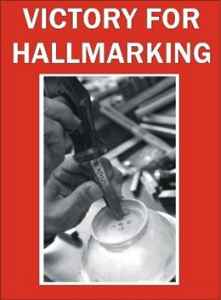
|
The bulletin of The Goldsmiths Company Assay
Office reports that its appeal
(see our May Newsletter) obtained a positive
result.
The British Government has completed their
deliberations regarding the Red Tape Challenge on
hallmarking recognising it as a "good regulation"
and therefore it will be maintained.
The entire results of the "retail" round have now
been reviewed and the Government has confirmed that
they are proposing to "simplify, improve or abolish
two-thirds of the retail regulations". Minister for
Business and Enterprise, Mark Prisk, said, "we are
preserving good regulation, such as the hallmarking
regime, for which there was strong support."
Dr Robert Organ, Deputy Warden, said, "without the
huge support of the trade the result of the Red Tape
Challenge could have been very different. We would
therefore like to say a very big thank you to all of
those who registered their support for hallmarking
on the Red Tape Challenge website. We are lucky that
we are in an industry that pulls together at times
like this and from a personal point of view it is
reassuring that hallmarking is viewed as being so
important."
|
In this column we present a page obtained from makers'
brochures, books, auction catalogs, advertising or whatever
other printed paper, related to silver, that may be of interest
for ASCAS members.
The images will be published at a "low resolution" level and for
private and personal use only
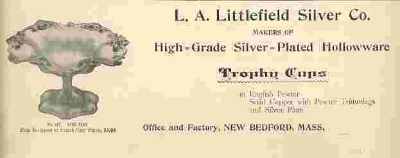
|
This month ASCAS presents an ancient advertisement
of
L.A. LITTLEFIELD SILVER CO
makers of
High-Grade Silver-Plated Holloware
Office and Factory, NEW BEDFORD, MASS.
The firm was established in 1884 by Needham and
L.A. Littlefield. The firm became Littlefield Silver
Co in 1905 and moved to Rockford, IL, in 1909 when
it was consolidated with the Rockford Silver Plate
Co.
|
"A WORD per MONTH"
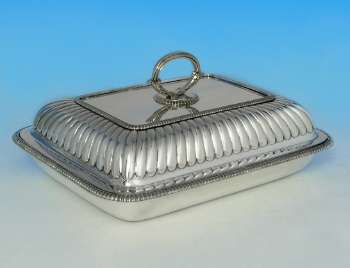
|
ENTRÉE DISH
VEGETABLE DISH
The entrée dish is shallow rectangular (sometimes
oval or octagonal) container employed in early English
usage to serve at the dinner the first cooked course.
The bottom is flat or stands on four low feet. The
entrée dish has a low-domed flat-top cover with a
detachable ring handle. Removing the handle/finial the
cover can be inverted and used as a serving dish.
In some cases they had at each end a handle by which to
carry the dish.......
more
|
"A SILVERSMITH per MONTH"
|
|
TOWLE MANUFACTURING CO
TOWLE SILVERSMITHS
The origin of the business
dates back to the Moulton family who settled in Newbury,
Massachusetts (later Newburyport) at the end of the 18th
century.
After six generations of Moulton silversmiths, Joseph
Moulton sold in 1857 the silver business he inherited
from William Moulton IV, to his father's two apprentices,
Anthony Francis Towle and William P. Jones to form Towle
& Jones, Co.
In 1873, the son of Anthony Francis Towle, Edward Bass
Towle, was added to the business, and the name was
changed to A.F. Towle & Son. It was in business through
1902, at which point their dies were purchased by
Rogers, Lunt and Bowlen, who were later to become Lunt
Silversmiths.....
more
|
"A BOOK ON MY SHELF"
In this column we present books, new
or ancient, dealing with silver in all its aspects (history,
marks, oddities...). This isn't a "book review" but only a fair
presentation of some useful "tools" that anyone may have in the
shelf of his bookcase. ASCAS members are invited to
contribute to this column
(click to enlarge images)
In the "book on my shelf" of this month ASCAS presents:
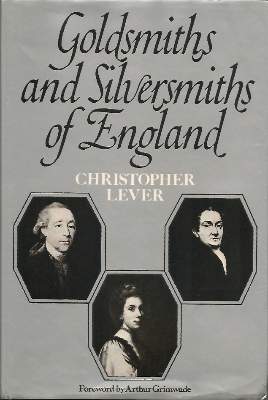
|
GOLDSMITHS AND SILVERSMITHS OF ENGLAND
by Christopher Lever
Hutchinson & Co Ltd - London
- 1975 -
Arthur G. Grimwade wrote in his foreword
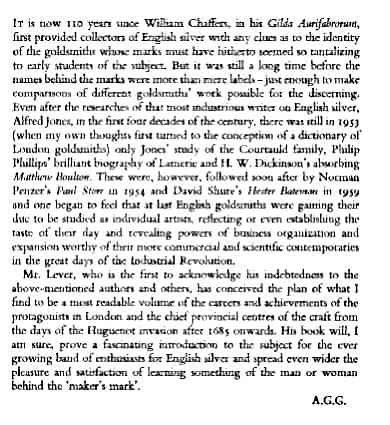
|
"A CREST per MONTH"
In this column we present images and
descriptions of Crests and Mottoes of British, Irish and
Scottish families as engraved on silver items.
ERNE
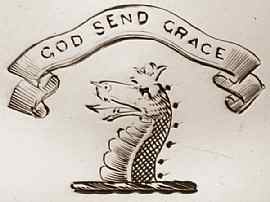

|
An Irish family (Creighton),
Earl of, Viscount and Baron.
A dragon's head, fire issuing from mouth.
Motto: God send grace
The crest was found on a silver chamber candlestick
hallmarked Sheffield 1897, maker Martin, Hall & Co Ltd,
Shrewsbury Works, Broad Street, Park, Sheffield. The
mark was entered in Sheffield Assay Office on February
2, 1880
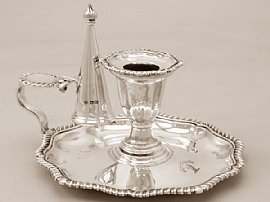
|
Closing our October 2011 edition of
ASCAS Newsletter I hope you have appreciated its content.
Your comments, suggestions and advice will be of great help.
My thanks to Dorothea Burstyn, Olivier Dumas, Piero Eduardo,
Joanne and Emmett Eldred, Pietro Fantazzini, Fran Isaacson,
Manuel Lema, Andrea Menarini, Carol Silverman, Joan Sunderland
for their invaluable contributions.
Giorgio Busetto
Secretary
DISCLAIMER AND PRIVACY POLICY
ASCAS is a community of people having a common
interest in antique silver.
It is a non-profit association without commercial links.
Membership is open to whomever has a true interest in
this subject matter.
ASCAS has no real property and no fees are requested nor
accepted from members.
ASCAS keeps in touch with its members only through
periodical newsletters, e-mails and web-site updating
and ignores and is not responsible for any other
activity pursued by its members.
Likewise, ASCAS is not responsible for opinions,
evaluation and images displayed, and in any form
published or supplied for publication, by its members
who, in any case, maintain the property of their works
and assure the respect of national and international
legislation about Intellectual Property.
ASCAS does not have the full addresses of its members (only
town, country and e-mail address are requested for
membership).
ASCAS handles and protects with care its members' e-mail
addresses, will not disclose the addresses to third
parties, will use this information only to reply to
requests received from members and for communications
strictly related to its activity.
These rules are expressly accepted by submitting the
membership request.
|
|
 newsletter
# 89 October 2011
newsletter
# 89 October 2011











